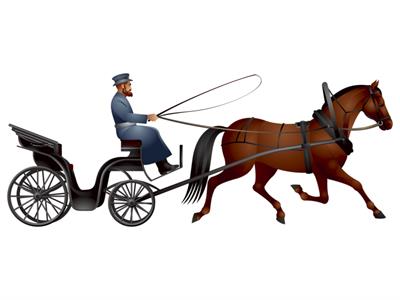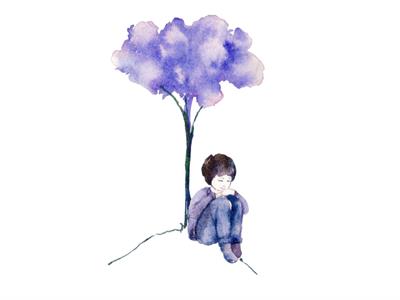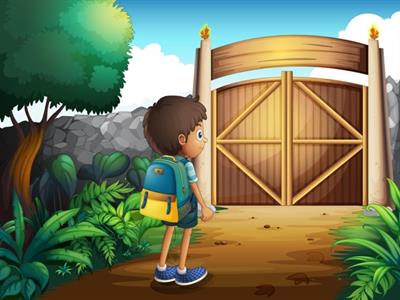
PUMPA - SMART LEARNING
எங்கள் ஆசிரியர்களுடன் 1-ஆன்-1 ஆலோசனை நேரத்தைப் பெறுங்கள். டாப்பர் ஆவதற்கு நாங்கள் பயிற்சி அளிப்போம்
Book Free DemoThe lesson “Jalebis” is written by Ahmad Nadeem Qasmi in Urdu. Later it was translated into English by Sufia Pathan. The story is about a schoolboy, and he is the protagonist of the story.
The story opens with the narrator stating that the story happened many years ago. When the story begins, the narrator was studying in grade five in a government school. It implies that the narrator was a schoolboy. His school was located in Kambelpur (popularly spelt as Campbellpur), which is currently known as Atak (popularly spelt as Attock). It is in Pakistan.
On a fine day, the boy went to the school with four rupees in his pocket. He carried the four rupees along with him for paying the school fees and fund amount. When he arrived at school, he discovered that his master, Ghulam Mohammed, was on leave. The master was in charge of collecting the fees from the students. The boy wanted to pay the money the very next day due to his master’s absence.
Later the boy mentioned that he kept the coins in his pocket throughout the day in school. While he was in school, the coins remained silent. It implies that the coins did not make any noise. Once the school got over and when he came out of the school, the coins started to speak.
The story opens with the narrator stating that the story happened many years ago. When the story begins, the narrator was studying in grade five in a government school. It implies that the narrator was a schoolboy. His school was located in Kambelpur (popularly spelt as Campbellpur), which is currently known as Atak (popularly spelt as Attock). It is in Pakistan.
On a fine day, the boy went to the school with four rupees in his pocket. He carried the four rupees along with him for paying the school fees and fund amount. When he arrived at school, he discovered that his master, Ghulam Mohammed, was on leave. The master was in charge of collecting the fees from the students. The boy wanted to pay the money the very next day due to his master’s absence.
Later the boy mentioned that he kept the coins in his pocket throughout the day in school. While he was in school, the coins remained silent. It implies that the coins did not make any noise. Once the school got over and when he came out of the school, the coins started to speak.
After hearing the boy’s statement, there remained a question of whether a coin can speak. Then the boy revealed that usually, coins never speak. They produce jingling noises when a person walks or moves from one place to another.
However, the boy said that the coins were speaking to him on that particular day. The narrator personified the "coins" and had given human characteristics to them. He later said that one coin inquired, "What are you thinking about?" It seems as though the coin was asking him what he felt when he saw the jalebis emerging out from the open pot and whether he thought they were coming out without any purpose.
However, the boy said that the coins were speaking to him on that particular day. The narrator personified the "coins" and had given human characteristics to them. He later said that one coin inquired, "What are you thinking about?" It seems as though the coin was asking him what he felt when he saw the jalebis emerging out from the open pot and whether he thought they were coming out without any purpose.

Jalebis in the cooking pot
Moreover, the coin told the boy that the jalebis were prepared for eating. Later it stated that people with money in their pockets had the right to purchase and consume jalebis. Furthermore, the coin tempted the boy by claiming that money was meant to be spent by those who liked to eat jalebis.
Later the boy responded to the four rupees. He said that he was a good boy and asked not to mislead him in the wrong way. The statement was made because the coins persuaded him to buy jalebis, and it stated that the money was intended for that purpose. The boy then said that it was not good for them if they were manipulating him. Furthermore, the boy added that he had many sweets or snacks at home and standing at the bazaar and gazing at things was considered a major sin. It means that the boy had enough food at home and, even glancing at something in the bazaar, was regarded as a major offence.
Moreover, the boy looked at the coins and stated that they were his fees and fund money. He also asked the coins how he would pay his fees if he spent the four coins. His other concern was how he would show his face to his master Ghulam Mohammed. His statement was based on the fact that his master was on leave on that particular day, and what excuse would he provide to his master if he spent the money on jalebis. In addition, he said that how he would face the Allah miyan at Qayamat. The term "Qayamat" refers to the day of judgement or resurrection. God would decide whether to send someone to hell or heaven based on the good or evil things they had done in their life. Based on the fact, the boy thought how he would face the Almighty if he spent the money and committed wrongdoing. He considered cheating a sin and claiming that he could not face God after making a mistake.
The boy then went on to explain his master's character. He stated that his master was a strict person. If his master became enraged, he would make the students stand on the bench as a punishment. Furthermore, he would forget the punishment and make the students remain standing on the bench until the last bell rang. As a result, he asked the coins to cease whispering to him in his ears, and he said he wanted to go home without wasting his time.
On the other hand, the coins did not like the way the boy spoke to them. As a result, all four coins began to speak at the same moment. People in the bazaar began to stare at him, and his pocket as the coins began to scream. It implies that the jingling of the coins caused people to widen their eyes and stare at them in a startled manner. Later the narrator stated that the coins of those days would make an unpleasant noise. At last, the boy, in fear, snatched all the four coins and clutched them tightly in his hand. As a result, the coins remained silent.
Moreover, the boy looked at the coins and stated that they were his fees and fund money. He also asked the coins how he would pay his fees if he spent the four coins. His other concern was how he would show his face to his master Ghulam Mohammed. His statement was based on the fact that his master was on leave on that particular day, and what excuse would he provide to his master if he spent the money on jalebis. In addition, he said that how he would face the Allah miyan at Qayamat. The term "Qayamat" refers to the day of judgement or resurrection. God would decide whether to send someone to hell or heaven based on the good or evil things they had done in their life. Based on the fact, the boy thought how he would face the Almighty if he spent the money and committed wrongdoing. He considered cheating a sin and claiming that he could not face God after making a mistake.
The boy then went on to explain his master's character. He stated that his master was a strict person. If his master became enraged, he would make the students stand on the bench as a punishment. Furthermore, he would forget the punishment and make the students remain standing on the bench until the last bell rang. As a result, he asked the coins to cease whispering to him in his ears, and he said he wanted to go home without wasting his time.
On the other hand, the coins did not like the way the boy spoke to them. As a result, all four coins began to speak at the same moment. People in the bazaar began to stare at him, and his pocket as the coins began to scream. It implies that the jingling of the coins caused people to widen their eyes and stare at them in a startled manner. Later the narrator stated that the coins of those days would make an unpleasant noise. At last, the boy, in fear, snatched all the four coins and clutched them tightly in his hand. As a result, the coins remained silent.

The boy held the coins tight in his fist
Then the boy, after taking few steps forward, released his hold from the coins. Suddenly, amongst all the four coins, the oldest coin said they were trying to convey something for his goodness but instead of obeying that, the boy had suppressed them tightly.
Later the oldest coin asked him to speak to him honestly about whether he liked to eat those hot crispy jalebis. Furthermore, it asked him to spend the coins for today on jalebis and pay the school fees tomorrow using his scholarship money. Then the oldest coin exclaimed that it was "end of story!” It is a phrase used to 'emphasise that there is nothing to add on a matter just mentioned'. Here, we can see that the oldest coin was trying to end the conversation by stating that the suggestion utilising the money was correct and that there was nothing more to say about it. Also, the phrase "Kissa khatam" means story ends, and "paisa hazam" means money disappears or money digested by consuming jalebis.
While reading the story, there remained a question of how the coins know that the boy would get the scholarship money the next day. The answer to this question might be the boy's inner sense was portrayed here as in the name of "coins". The statement was made because his subconscious mind knew that he would get the scholarship money, and with that, he could manage to pay the school fees.
While coming back to the story after hearing the oldest coin's talk, the boy stated that what the coin was trying to tell was neither correct nor wrong. Then he asked the oldest coin to stop talking and give him some time to think about it. After thinking for a while, the boy said that he was not an ordinary boy. It implies that he was not a common sort of boy who could spend the money unnecessarily. Then the boy claimed that the jalebis coming out from the large pot were not ordinary jalebis. He further explained that the jalebis seemed to be crisp, fresh and full of filled in sweet syrup. From this paragraph, one can understand that the boy desired to purchase the jalebis. But he was battling with his inner self as he thought about the problems and fears he faced. On the other hand, he was still confused about what he should do.
While coming back to the story after hearing the oldest coin's talk, the boy stated that what the coin was trying to tell was neither correct nor wrong. Then he asked the oldest coin to stop talking and give him some time to think about it. After thinking for a while, the boy said that he was not an ordinary boy. It implies that he was not a common sort of boy who could spend the money unnecessarily. Then the boy claimed that the jalebis coming out from the large pot were not ordinary jalebis. He further explained that the jalebis seemed to be crisp, fresh and full of filled in sweet syrup. From this paragraph, one can understand that the boy desired to purchase the jalebis. But he was battling with his inner self as he thought about the problems and fears he faced. On the other hand, he was still confused about what he should do.

Fresh crispy jalebis
When the boy thought about the crispiness of the syrupy jalebis, his mouth started watering. He believed that he would not be easily influenced because he was regarded as one of the class's most "promising students". The phrase "promising students" means that he was an obedient student who had a successful future in life. In addition, the boy stated that he won a monthly scholarship of four rupees during his grade four exams, as he was one of the class's brightest students. Furthermore, the boy indicated that he came from a wealthy family and had a good reputation at school.
The boy then claimed that his teachers had never beaten him. On the other hand, the boy said that his master would call him to punish the other boys. The master might have done so because he thought of the boy as an excellent student who used to study hard and follow the teacher's orders. The master thought of showing the boy as a role model to impress the other students with how good he was. Then he added that he had a good name at school and that if anyone saw him standing at the bazaar eating jalebis, it would ruin his reputation. Assuming everything, he determined that purchasing the jalebis was not fair. As a result, he returned home, clutching the coins securely in his hands. The purpose of tightly holding the coins was that they wouldn't produce any unpleasant noises.
The coins in his pocket were trying to persuade him that day, and they continued to tempt him to buy the jalebis. Later the boy sat on his bed when he got home. Then, the coins began to communicate with him. When he went to have his lunch, the coins began to scream again. However, the boy was utterly fed by the repeated noises. So he couldn't control himself and ran towards the bazaar without wearing any footwear.

A boy sitting on the bed
Even after reaching the shop, the boy had a fear in his mind. With that fear, he quickly ordered the jalebi seller to weigh a rupee's worth of jalebis. The jalebi seller's puzzled expression seemed to inquire where the boy kept the vehicle in which he wanted to carry all those jalebis. Here, the phrase "where I had the handcart " is an exaggerated expression because the narrator didn't mean a real hand cart, but instead, he was questioning how he would carry the many jalebis he was purchasing. Later, he explained that one rupee was worth more than twenty rupees in the past. Also, he stated that in those days, things were cheap.
Then, the jalebi seller spread out an entire newspaper and piled a stack of jalebis on top of it.
While the boy was getting the pile of jalebis from the jalebi seller, he noticed their horse cart coming from a distance. In the tonga, the boy's Chachajaan (uncle) was there. He was returning from the court. When he saw his uncle, the boy held the jalebis in his chest and ran towards a narrow lane. He eventually came to a safe spot. He then began eating the jalebis. The boy ate as many jalebis as he could. He further said that if somebody touched his stomach, jalebis would spew from his mouth and nostril. It means that he ate a lot of jalebis.

Chachajaan coming in a Tonga
At once, the children in the neighbouring areas gathered around the narrow lane. The boy's stomach was full of jalebis, and he thought of having some fun with the neighbouring boys. As a result, he began giving out jalebis to the children gathered around him. Children began to leap and shout in delight after receiving the jalebis.
Very soon, a lot of children had arrived at the place. They might have come there after hearing about the good news about a boy distributing jalebis to neighbours. After that, the jalebis were finished, so he ran near to the jalebi seller and bought jalebis for another rupee.
After buying the jalebis, the boy stood in front of one of the houses' raised platforms (verandah). Then he started giving the jalebis to the children, like the Governor Saheb issuing rice to the poor and needy people on the day of Independence. It implies that while he was distributing the jalebis, he thought of himself doing great social work. Moreover, the crowd didn't get dissolved. As time passed, the crowd increased.
Meanwhile, not only children but also beggars arrived at the place. They tried to get jalebis from the boy, but it resulted in an attack. The statement implies that on seeing the jalebis, the beggars thought of obtaining it. So while standing in the crowd, probably there would be a fight for getting jalebis.
Later, the boy thought he would have undoubtedly been chosen in the assembly if children were nominated for the election and won that day. Furthermore, he stated that if he gave a signal to kill someone, the children and crowd around him would follow his orders. He felt they would do whatever he asked because he had given them enough jalebis. Moreover, he bought jalebis for the remaining coins and distributed them to the children and the large crowd. After the jalebis were distributed, the boy walked over to the public tap and washed his mouth and hands.
After that, the boy returned home by showing his innocent face as if he hadn't seen a piece of jalebi in his lifetime. Later the boy thought that he had no trouble while eating the jalebis, but digesting them was seemed to be another big problem. While he was walking, he felt that the air (gas) released noisily through his mouth in every breath. He also thought that two or three jalebis would pop out from his mouth whenever he took a breath.

The boy returned home by showing his innocent face
During the night, the boy had to eat his dinner. If he failed to eat his food, his parents would question him why he wasn't eating anything. In addition, if he pretended to be ill to get away from his parents, they would call a doctor to check his health condition. The doctor would arrive at the spot, and he would check his pulse and tell his parents that Munna had eaten too many jalebis. As a result, his parents would scold him.
As a result of overeating jalebis, the boy had a stomach ache. Due to stomach pain, the boy couldn't sleep properly. So he spent the whole night curled up like a jalebi. The boy laid in the shape of a jalebi on his bed, which was referred to as "coiled up." Later, he felt, "Thank God", because he did not eat the four rupees worth of jalebis alone. The boy then remarked that people would usually say that flowers would drop from the children's mouths when they speak. It refers to children's immature speech. On the other hand, the boy claimed that if he ate the four rupees worth of jalebis instead of flowers, the crispy pieces of jalebis would come out with each word. He went on to say that he would be the first boy in the world to say a single word that would cause crispy jalebis to fall from his mouth.

The boy had a stomach ache
Later the boy said that children were not born with stomachs; instead, they were born with digestive machines. The statement denotes that children would not usually sit in one place; instead, they would move around and run away. In such a situation, their bodies were constantly active. As a result, whenever they ate too much food, it was entirely digested. In addition, he stated that his digestive system continued to function throughout the night. It indicates that he was fine in the next morning. Later, when he woke up, like every day, he cleaned his face. Then he went to the school carrying chalk and slate in hand like an obedient student.
While he was walking to school, he hoped that he would receive the scholarship money on that day. He also believed that after he paid the school fees, his jalebis will be entirely digested. It suggests that he had purchased the jalebis with the fees, and when he remit the school fees with the scholarship amount, he would be free of worry. However, when the boy arrived at school, he learned that he would receive the scholarship money the next month. His head began to spin when he learned about it. The boy later felt like he was standing on his head and couldn't get back on his feet no matter how hard he tried. It means that he couldn't manage the situation any longer. Whatever he had desired had finally failed.
While the boy was in shock, master Ghulam Mohammed informed the students that the fees would be collected during the interval or break time. When the interval bell rang, the boy placed his school bag under his arms and walked out. He then simply moved forward, following his nose. It implies that he didn't know where he was going. As a result, he merely bowed and walked in the direction. While walking, the boy thought that if no mountain or ocean stopped his way, he would have reached the end of the earth. It indicates that the boy wished to escape from the situation. He also believed that when the world end, the sky began and that when he arrived there, he would meet the Almighty.
After meeting the almighty, the boy thought he would say to Allah miyan to save him for this time. He also planned to pray to God to command the Angel to place the four coins in his pocket. These were the things the boy prayed to God because he thought that the almighty would come and save him. Furthermore, he said that if the Angel indeed dropped the coins in his pocket, he would use it only to pay fees and not spend it on eating jalebis. The statement was made because the boy understood that if he went to school without the money, his master would interrogate him, his parents would learn about it, and his dignity would be shattered. After thinking about it in mind, he asked God to help him.
The boy dreamt of reaching the end of the earth and meeting God, but he could not do it. On the other hand, the boy arrived at the Kambelpur railway station. While seeing the railway station, the boy remembered that his elders (it might be someone from his family) had warned him not to cross the railway tracks. The reason behind the statement was that it was not safe to cross the railway track without anyone's company. Also, he recalled that his elders had warned him not to use the fees money to eat jalebis. The boy wondered how the elders' instructions had escaped his mind, but he couldn't find any convincing answer.
While he was walking to school, he hoped that he would receive the scholarship money on that day. He also believed that after he paid the school fees, his jalebis will be entirely digested. It suggests that he had purchased the jalebis with the fees, and when he remit the school fees with the scholarship amount, he would be free of worry. However, when the boy arrived at school, he learned that he would receive the scholarship money the next month. His head began to spin when he learned about it. The boy later felt like he was standing on his head and couldn't get back on his feet no matter how hard he tried. It means that he couldn't manage the situation any longer. Whatever he had desired had finally failed.
While the boy was in shock, master Ghulam Mohammed informed the students that the fees would be collected during the interval or break time. When the interval bell rang, the boy placed his school bag under his arms and walked out. He then simply moved forward, following his nose. It implies that he didn't know where he was going. As a result, he merely bowed and walked in the direction. While walking, the boy thought that if no mountain or ocean stopped his way, he would have reached the end of the earth. It indicates that the boy wished to escape from the situation. He also believed that when the world end, the sky began and that when he arrived there, he would meet the Almighty.
After meeting the almighty, the boy thought he would say to Allah miyan to save him for this time. He also planned to pray to God to command the Angel to place the four coins in his pocket. These were the things the boy prayed to God because he thought that the almighty would come and save him. Furthermore, he said that if the Angel indeed dropped the coins in his pocket, he would use it only to pay fees and not spend it on eating jalebis. The statement was made because the boy understood that if he went to school without the money, his master would interrogate him, his parents would learn about it, and his dignity would be shattered. After thinking about it in mind, he asked God to help him.
The boy dreamt of reaching the end of the earth and meeting God, but he could not do it. On the other hand, the boy arrived at the Kambelpur railway station. While seeing the railway station, the boy remembered that his elders (it might be someone from his family) had warned him not to cross the railway tracks. The reason behind the statement was that it was not safe to cross the railway track without anyone's company. Also, he recalled that his elders had warned him not to use the fees money to eat jalebis. The boy wondered how the elders' instructions had escaped his mind, but he couldn't find any convincing answer.
Then the boy noticed a shade-giving tree at the side of the railway track. He then sat under the tree, wondering whether there was a child in the world who was unluckier than him. He thought that he had spent the money for jalebis, and so, he was sitting under the tree near the railway track. On the other hand, the boy would have been in school by this time. As a result of his wrongdoing, he was unable to attend school. When the coins first made a noise in his pocket, the whole thing appeared to be so easy and simple. It advised him to consume jalebis with the fees and then pay the fees with the scholarship money.

The boy sitting under a tree
While listening to the suggestion from the coins, the calculations seemed to be too easy for the boy. He thought that adding two with two answers four, and he didn't even think sometimes it would answer five. The statement implies that the boy thought of spending the four coins to buy jalebis and then pay the fees with the money he would get from the scholarship. When he thought about the plan, everything appeared very clear. However, he did not expect the scholarship amount would arrive only in the next month. If he knew it earlier, he would have postponed the jalebi eating for the following month.
Therefore, for the offence of consuming a few jalebis for the first time in his life he was absent from school. Even though he belonged to a well-to-do family, his situation had made him sit under a tree near an isolated corner of the railway station. After sitting under the tree, he felt like crying while thinking about the mistake he had made.
The boy thought of crying at first after thinking about the situation. Then he felt like laughing when he realised the tears he was shedding were sweet jalebi tears. When he afterwards remembered the jalebis, his mind moved to the fees money, and from there, his mind recalled his master's beatings. While he was thinking about the punishment, he was reminded of God, later he closed his eyes and prayed to God to save him from his current situation.
Later, the boy said to Allah that he was a good boy who had memorised all of the Quran's prayers. Furthermore, the boy claimed that he knew the last ten chapters or sections of the Quran. It suggests that he had memorised everything from it and that if God wanted him to utter a prayer, he would be ready. The term "Ayat-al-kursi" refers to the verses in the Quran that Allah revealed to help guide people from evil things. It is believed that the verses are so powerful that by simply reciting them, people in the home and their families would be protected from many evils and the powers of Shaitan. "Ayat-al-kursi" is the 255th verse of Surah al-Baqarah, commonly referred to as Ayatul Kursi (meaning "The Throne").
Then the boy pleaded with God by stating that he was a devotee of Allah and what he needed was the amount he had spent on jalebis. He admitted his mistake and said that he did not eat the whole jalebis by himself, and also he gave them to impoverished children and others in need. Even after giving the children, he recognised that it was his mistake and had no right to blame anybody else. He further stated that if he had known the scholarship would be issued the next month, he would not have bought the jalebis or given it to the children.
Then the boy pleaded with God by stating that he was a devotee of Allah and what he needed was the amount he had spent on jalebis. He admitted his mistake and said that he did not eat the whole jalebis by himself, and also he gave them to impoverished children and others in need. Even after giving the children, he recognised that it was his mistake and had no right to blame anybody else. He further stated that if he had known the scholarship would be issued the next month, he would not have bought the jalebis or given it to the children.
Later, the boy prayed to God to put four rupees in his bag. He also remarked that he would be disappointed with God's acts if he had more than four rupees in his backpack. It means that he only needed four rupees and had no expectations. He went on to say that if he eats sweets with his fees money again, God can punish him as a way he punishes a thief. As per the Quran, the punishment for theft is cutting off their hands. Later the boy asked the Almighty, again and again, to save him from his problem. He said the words "save him" repeatedly because God did not come to help him. So he pleaded with Allah miyan.
In addition, the boy said that Allah's treasury is filled with everything, and there is no shortage of money in it. The boy recalled how, every month, the peon would bring a lot of money to his home. It implies that the boy believes that it was Allah to gave them money. Allah gave them money as if his treasury was filled with coins. He says to Allah that he was the nephew of a high-ranking official. At last, he asked God, "Won't you just give me four rupees?"
In addition, the boy said that Allah's treasury is filled with everything, and there is no shortage of money in it. The boy recalled how, every month, the peon would bring a lot of money to his home. It implies that the boy believes that it was Allah to gave them money. Allah gave them money as if his treasury was filled with coins. He says to Allah that he was the nephew of a high-ranking official. At last, he asked God, "Won't you just give me four rupees?"

Munna praying to God
Then the boy recited the holy name of God and opened the bag. He discovered there was no money in the bag when he opened it. Later, the boy realised that the people’s statements were factual and that no one can change what fate had decided. Whatever mistake one makes, he must face the consequences. He made the statement because he knew that he wouldn’t get any coins back. He only had a few textbooks and notebooks in his bag instead of four coins. In addition, his bag had an eraser, pencil, and sharpener. Also, he had an id card in his bag that was previously given to him by his uncle.

Things in Munna's bag
The boy cried as loudly as he could after learning that the almighty had not kept anything in his bag. Later, he realised that his school was probably ended and the students were on their way home. As a result, he considered leaving. Later, he felt exhausted and failed in his attempts, so he got up and walked from the railway station. He then proceeded to the bazaar, where he awaited the school bell to ring. He thought that after the children were out of school, he could join them. The statement was made because then only his parents would believe that he had come from the school.
As the boy was tired and sad, he did not even realise that he was standing in front of the same shop. At first, he thought that going to the jalebi shop was a sin, but without even knowing, he stood in front of that jalebi seller’s shop. Suddenly the boy heard a voice from his behind. It was none other than the sweet seller. After seeing the boy in front of his shop, the halwai asked him, "Kyon Bhai, shall I weigh a rupee’s worth?" Here the phrase "Kyon Bhai" literally means "why brother" in English. It is an expression of greeting. Coming back to the story, the jalebi seller asked the boy whether he did not want any jalebis today.

Sweetmeat seller
After hearing the sweet seller’s words, the boy became enraged. The boy thought of telling him that he didn’t require his jalebis today. But what he needed was the man’s toasted liver so that he could eat it. It implies that the boy was already miserable, and when thejalebi seller asked him whether he weighs a rupee worth of jalebis, the boy became angry. Later, the boy felt very weak, and he did not say anything to the jalebiwala. At last, he slowly walked away from there.
The boy then moved slowly to his home. The following day he did the same as the previous day. He got out of bed, dressed in his school uniform, and left the house. Later, he walked up to the school's gate. Instead of entering the classroom, he turned around and proceeded towards the railway station. Then he went near the same tree and sat under it and started saying the prayers. Then he pleaded with God to help him today because it was the second day. It implies that the boy asked God to give him money as he came for the second day and said his prayers.

Boy standing near the school gate
Later the boy thought of playing a game with God. He believed God was not giving the coins as he desired because he sat there and prayed to God without moving anywhere. It suggests that God would show his magical powers when he was not there. So he thought of playing a game with God. He said to God that he would go from there till the signal and return. Later he pleaded with God to place the coins under the big rock. Then he asked God whether he was ready for the task. Later he counted one-two-three and walked towards the signal hoping that God would help him with his game.
Then the boy went to the signal and returned smiling, thinking about what was going to happen. On the other hand, he did not have the courage to raise the rock. The reason behind the statement was that if the coins were not there, his hopes would be shattered. On the other hand, he thought that if coins were not there, then what would be there under the rock.
After calling out the name of Allah, the boy lifted the rock. To his surprise, he saw a big hairy worm under the rock. It wiggled, twisted, and curled towards him. The boy became terrified after seeing the worm, shouted even louder, and ran from there. Later he dashed to the railway signal. Then he moved forward by dragging the body close to the ground. As a result, he reached the tree. The boy thought of keeping his gaze away from the rock. But while he was packing his belongings and getting ready to depart, he had to return his attention to the rock. Later he asked his readers whether they know what he had seen there. He had seen the worm curled up on the rock and staring at him. By addressing the worm as Mr Worm, the boy was personifying it. The title "Mr" and the phrase "staring at me" give the worm the human characteristic.
Later the boy thought of playing a game with God. He believed God was not giving the coins as he desired because he sat there and prayed to God without moving anywhere. It suggests that God would show his magical powers when he was not there. So he thought of playing a game with God. He said to God that he would go from there till the signal and return. Later he pleaded with God to place the coins under the big rock. Then he asked God whether he was ready for the task. Later he counted one-two-three and walked towards the signal hoping that God would help him with his game.
Then the boy went to the signal and returned smiling, thinking about what was going to happen. On the other hand, he did not have the courage to raise the rock. The reason behind the statement was that if the coins were not there, his hopes would be shattered. On the other hand, he thought that if coins were not there, then what would be there under the rock.
After calling out the name of Allah, the boy lifted the rock. To his surprise, he saw a big hairy worm under the rock. It wiggled, twisted, and curled towards him. The boy became terrified after seeing the worm, shouted even louder, and ran from there. Later he dashed to the railway signal. Then he moved forward by dragging the body close to the ground. As a result, he reached the tree. The boy thought of keeping his gaze away from the rock. But while he was packing his belongings and getting ready to depart, he had to return his attention to the rock. Later he asked his readers whether they know what he had seen there. He had seen the worm curled up on the rock and staring at him. By addressing the worm as Mr Worm, the boy was personifying it. The title "Mr" and the phrase "staring at me" give the worm the human characteristic.

Munna saw a worm
While the boy was walking, he thought he would cleanse himself thoroughly, dress in clean clothing, and return to the same location to pray to God the next day. Then he decided that from morning till afternoon, he would read the prayers from the Quran. His prayers were for God to grant him the four rupees he needed to pay his school fees. Later, he decided that if He did not give him the coins, he would be forced to learn how to bargain or make agreements with God.
Then the boy thought, who would give him the four rupees if God did not give him. Then the boy returned home from the railway station. On the other hand, the boy gave the impression of having come from the school. He was caught when he returned home. The boy's absence from school had been reported to his parents and they came to know that he was not attending the class.
Later the boy pointed out what had happened after getting caught at his home was already over. It was also pointless to discuss it. The boy went on to say that until he was in the seventh or eighth grade, he wondered what harm it could have done to anyone if the Almighty had sent him four rupees that day. It means that he was unsure of the problems it would cause if God had given what he asked for. Later, when he became matured enough, he realised that Allah had done the right thing. If Allah had given him what he desired, the boy would have committed another sin by pleasing God.
When Munna grew older, he realised that if Allah miyan had provided all the things people wanted, there would be no difference between humans and birds. Here, the author compared with the vultures and crows in the nests because these birds won't keep any effort to hunt for food. Instead, they feed on the remains of dead animals, called carrion and lives in their nests. In the same way, a man would not learn anything, even the art of making jalebis, if he would get everything without any effort. This was the lesson Munna learned from the incident.
Then the boy thought, who would give him the four rupees if God did not give him. Then the boy returned home from the railway station. On the other hand, the boy gave the impression of having come from the school. He was caught when he returned home. The boy's absence from school had been reported to his parents and they came to know that he was not attending the class.
Later the boy pointed out what had happened after getting caught at his home was already over. It was also pointless to discuss it. The boy went on to say that until he was in the seventh or eighth grade, he wondered what harm it could have done to anyone if the Almighty had sent him four rupees that day. It means that he was unsure of the problems it would cause if God had given what he asked for. Later, when he became matured enough, he realised that Allah had done the right thing. If Allah had given him what he desired, the boy would have committed another sin by pleasing God.
When Munna grew older, he realised that if Allah miyan had provided all the things people wanted, there would be no difference between humans and birds. Here, the author compared with the vultures and crows in the nests because these birds won't keep any effort to hunt for food. Instead, they feed on the remains of dead animals, called carrion and lives in their nests. In the same way, a man would not learn anything, even the art of making jalebis, if he would get everything without any effort. This was the lesson Munna learned from the incident.